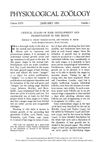 421 citations,
April 2012 in “The New England Journal of Medicine”
421 citations,
April 2012 in “The New England Journal of Medicine” Alopecia Areata is an autoimmune condition causing hair loss with no cure and treatments that often don't work well.
 393 citations,
November 2000 in “Archives of General Psychiatry”
393 citations,
November 2000 in “Archives of General Psychiatry” Testosterone is important for men's sexual function, may help some women's sexual desire, while other hormones and neurotransmitters also play complex roles in sexual behavior.
 236 citations,
January 1951 in “Physiological zoology”
236 citations,
January 1951 in “Physiological zoology” Hair growth and pigmentation in mice involve specific stages crucial for research.
 219 citations,
March 2004 in “Journal of The American Academy of Dermatology”
219 citations,
March 2004 in “Journal of The American Academy of Dermatology” 5% and 2% minoxidil solutions effectively promote hair growth and reduce hair loss, with 5% being slightly more effective but having more side effects.
 187 citations,
June 1999 in “Journal of The American Academy of Dermatology”
187 citations,
June 1999 in “Journal of The American Academy of Dermatology” Finasteride effectively treats frontal hair loss with few side effects.
 160 citations,
January 2009 in “Clinical Drug Investigation”
160 citations,
January 2009 in “Clinical Drug Investigation” HairMax LaserComb® effectively promotes hair growth and stops hair loss in males with androgenetic alopecia, with no serious side effects.
 127 citations,
June 2008 in “British Journal of Clinical Pharmacology”
127 citations,
June 2008 in “British Journal of Clinical Pharmacology” Low doses of some substances can be beneficial, while high doses can be harmful or toxic.
 123 citations,
December 2015 in “Journal of Neuroendocrinology”
123 citations,
December 2015 in “Journal of Neuroendocrinology” New targets for making and using brain-synthesized steroids could lead to better treatments for brain disorders and alcoholism.
 117 citations,
May 2017 in “Human Reproduction Update”
117 citations,
May 2017 in “Human Reproduction Update” The update highlights that non-classic congenital adrenal hyperplasia is common in women with excess male hormones, requires specific hormone tests for diagnosis, and has various treatment options depending on age and symptoms.
 114 citations,
March 2018 in “PLOS Medicine”
114 citations,
March 2018 in “PLOS Medicine” Women with PCOS are more than twice as likely to develop nonalcoholic fatty liver disease.










